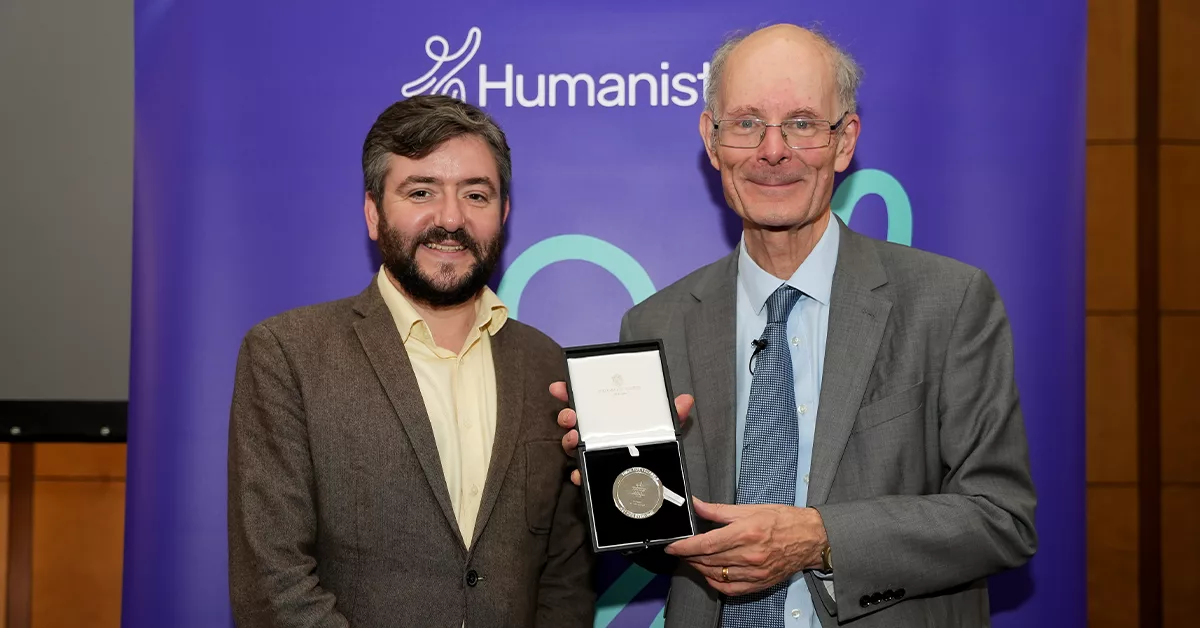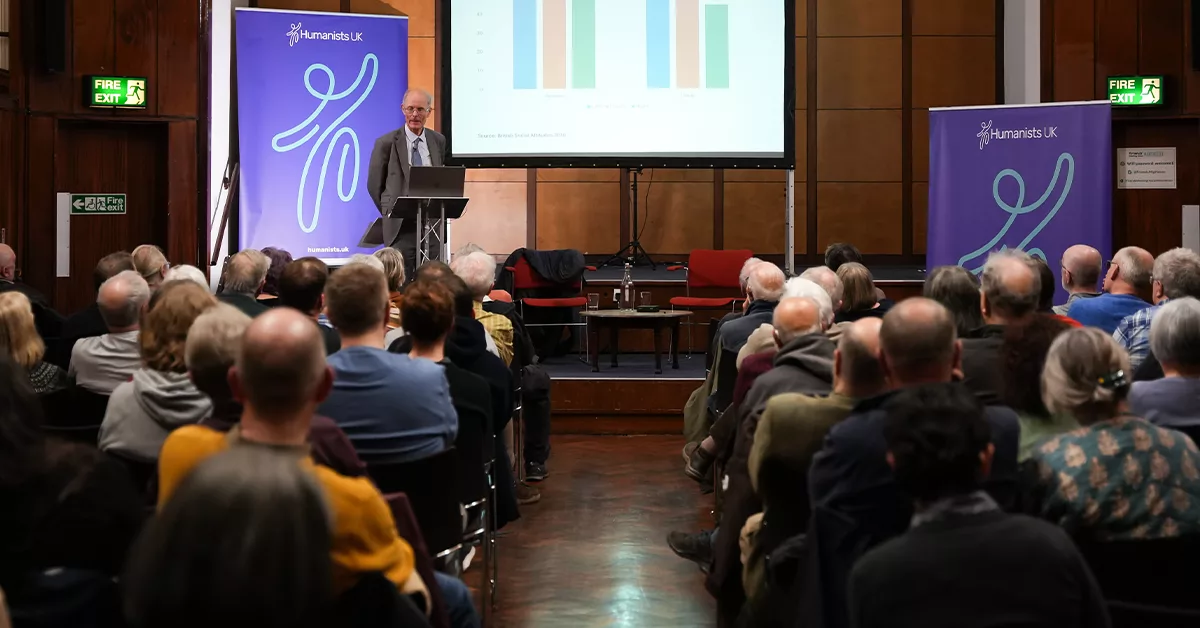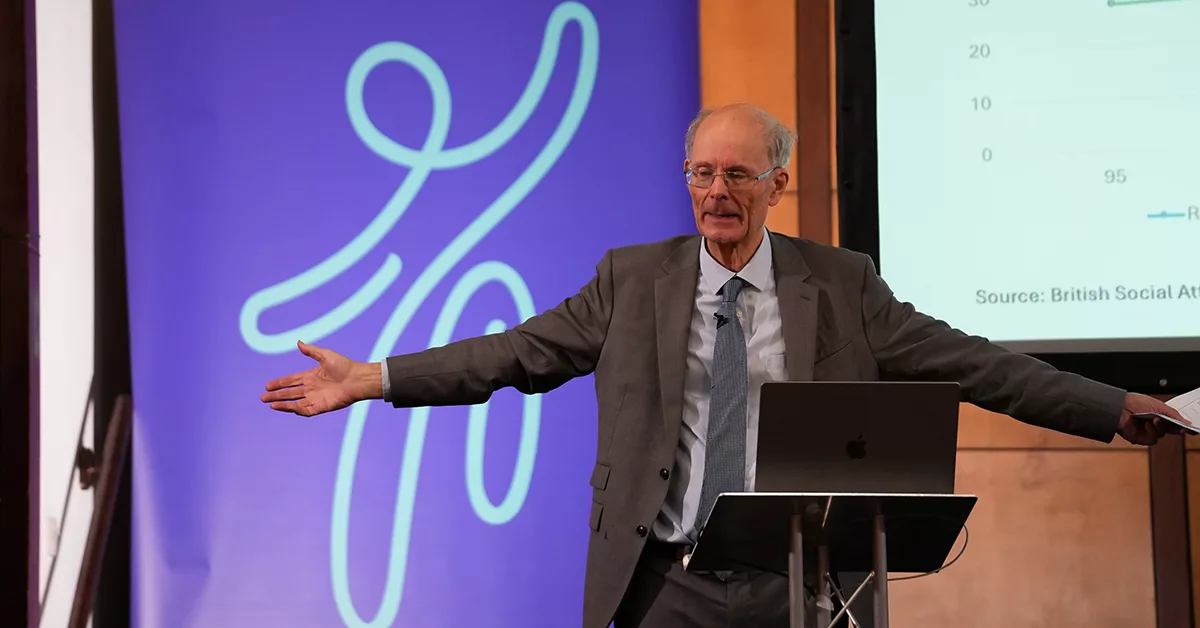
Humanists UK returned to Manchester for the 2024 Holyoake Lecture, given by distinguished psephologist and political scientist Professor John Curtice, the recipient of the Humanists UK Holyoake Lecture Medal.
Professor Curtice’s lecture focused on the phenomenon of ‘culture wars’ in the UK, analysing how shifts in public attitudes and values are influencing politics and society. Issues like national pride, women’s and minority rights, and immigration are challenging long-standing British identities and contributing to a new, increasingly fragmented political landscape.
Professor Curtice argued that the UK is becoming increasingly divided along a libertarian-authoritarian axis – a departure from the previously more salient ‘left-right’ divide. This new fault line runs across existing political camps, and separates those who prioritise personal freedom, social diversity, and global integration from those who favour social order, national sovereignty, and traditional authority. This shift, he suggested, was being driven by a confluence of factors, including rising educational attainment, secularisation, as well as the growing influence of younger, more progressive generations. As liberalism progresses, its fruits become more politically contested.

As a result, demographic factors such as age have shifted from being a ‘secondary’ predictor of political opinion to a major political faultline in and of itself. Professor Curtice highlighted the softening of national pride, with younger generations less likely to celebrate Britain’s imperial past. He also noted the seemingly paradoxical shift in attitudes towards immigration, with public acceptance and appreciation of immigrants’ economic and cultural contributions increasing, rather than falling, immediately following the Brexit vote – a decision often associated with anti-immigration sentiment. On this and other issues, the public was undergoing a polarisation – a flight to the extremes – the like of which we more commonly associate with the United States and its entrenched political divides.
His analysis was punctuated with compelling data, demonstrating how these cultural shifts are reshaping the political landscape. He showed how ‘culture war’ issues are increasingly influencing voting patterns. ‘The culture wars are not just about policy disagreements,’ he explained. ‘They’re a reflection of who we are and who we want to be as a society.’
Following a lively and wide-ranging Q&A, Andrew Copson awarded Professor John Curtice the prestigious Holyoake Lecture Medal:
‘It’s in knowing ourselves and what divides us that we can perhaps begin to glean those things that might unite us, and there is perhaps no person who has done more to shed a light on the British public than John Curtice. I’m delighted, therefore, to present John Curtice with the Holyoake Lecture Medal 2024′

Notes
For further comment or information, media should contact Humanists UK Director of Public Affairs and Policy Richy Thompson at press@humanists.uk or phone 0203 675 0959.
The Holyoake Lecture explores an aspect of politics or contemporary social or political issue, especially as it relates to secularist and humanist issues, including liberalism, democracy, social justice, feminism, anti-racism, LGBT rights, or equality. The Holyoake medallist has made a significant contribution in one of these fields. The lecture and medal are named for the nineteenth century humanist George Jacob Holyoake, who among many other achievements coined the word ‘secularism’ and was a lifelong progressive political activist.
Humanists UK is the national charity working on behalf of non-religious people. Powered by over 130,000 members and supporters, we advance free thinking and promote humanism to create a tolerant society where rational thinking and kindness prevail. We provide ceremonies, pastoral care, education, and support services benefitting over a million people every year and our campaigns advance humanist thinking on ethical issues, human rights, and equal treatment for all.
